- Homepage
- Coloured foods
- Red Foods for Better Health
Red foods for better health
Red foods for better health explains the need for many coloured veggies and fruits in our diets; and the role they play in promoting wellness and helping to prevent disease.
Good morning and welcome to day 3; why we should be enjoying red foods on a regular basis.
Making time for better health
People often tell me they just do not have the hours to choose, prepare and cook whole meals; fast food is a great way to create space in their lives for other more important things.
So let’s back up
for a moment and consider why it really is worth spending the time
preparing and enjoying nourishing food; and even growing it.
Whether we like it or not, it is finally dawning on many people that we must take the time to care for God’s world; or we are going to spend a great deal more coping with the devastating effects of global warming and climate change.
Hurricane Beryl has just sent us a message but are we willing to listen? It is the first-ever Category 4 storm in June.
And in similar vein, we either spend the time getting exercise, taking holidays and enjoying healthy food or we will be forced to take a lot more consulting doctors and queuing up for medicines; not to mention the cost, pain and the likelihood of a poor lifestyle foreshortening our lives.
Enough of that; it’s my philosophical justification for the amount of time we spend gardening, preparing and cooking good food. Fresh fruit and veggies taste so much better in any case.
Red foods for better health
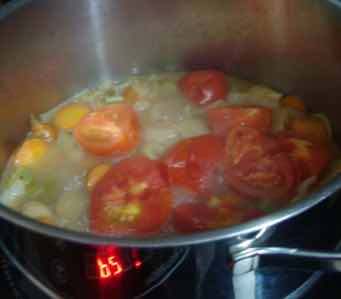
Tomatoes and onions are the foundation of so many tasty and nutritious dishes; this is borscht in the making. On Friday we will look at the phytochemicals in beets that are so important.
Lycopenes and capsaicin in red foods
So what’s special about red foods like pomegranates, tomatoes and watermelon? To which we could add many more like peppers and radishes.
We mentioned earlier that plants have many thousands of coloured phytonutrients that researchers are only now beginning to understand. Today we will talk about just two of them; lycopenes and capsaicin. Don’t bother memorising their names but do try and remember a little about why scientists are calling them “functional foods;” those that promote health and help to prevent disease.
Researchers were determined to find out why Italians living in America were far less prone to prostate cancer; eventually they realised that it was because they ate so many tomatoes, raw and cooked. It is the most common life-threatening malignancy in men.
Lycopenes[1] are the nutrients that make tomatoes red; they are powerful antioxidants that mop up the free radicals that unbeknown to us, below the radar are causing such havoc with our cells.
Prevention remains better than a cure but even in those with prostate cancer researchers have found that the PSA marker drops by 18% within a month after starting to eat dishes with cooked tomatoes daily. Extra fat helps with the absorption of these carotenoids as they are known. Fry them with olive or coconut oil; and butter perhaps.
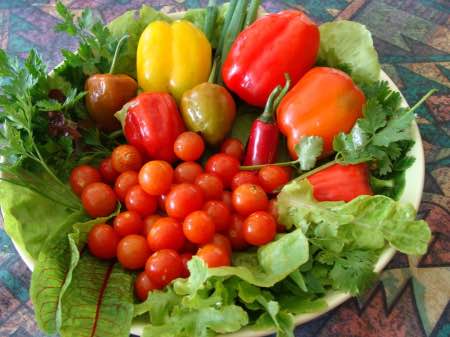
Peppers for the capsaicin
And secondly capsaicin is the nutrient in peppers that gives them their pungent flavour.
Firstly a little science for those who want to understand why we should all be enjoying tomatoes, peppers and chilies daily, even in small quantities. Normal cells in the body undergo what is known as apoptosis; new ones are continually being formed and then dying.
Malignant tumours have developed a way of avoiding apoptosis; they have deregulated the genes that control this programmed death of normal cells. Instead they just keep on growing.
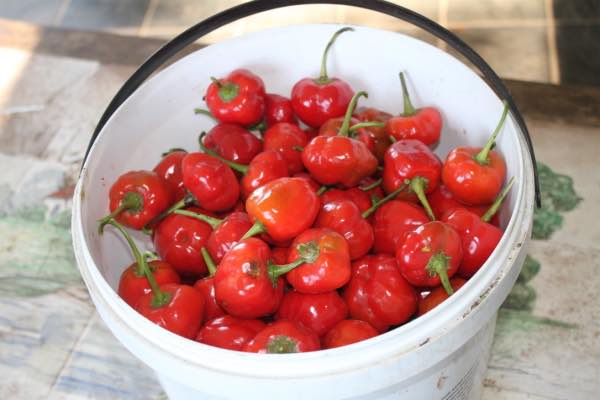
Scientists have now discovered that the capsaicin in hot red peppers is able to induce this normal cell death called apoptosis again in cancerous prostate tumours that have managed to circumnavigate this orderly process[2]; and those in other organs too no doubt.
The point to be emphasised yet again is that there are literally thousands of these nutrients in coloured foods. There is absolutely no point in fussing over whether we have consumed enough capsaicin or lycopene today; we would go mad.
Instead just try to eat as many coloured foods as you possibly can every day.
“The remedy oft in thyself doth lie.”
- Shakespeare
It is my standpoint that God has created the ways and means for us to enjoy long and fruitful lives. The so-called industrial diet of today is deficient in many, even most of these nutrients. Instead is it perhaps time to restore your own little Eden?
“There is increasing evidence that exposure to plants and green space, and particularly to gardening, is beneficial to mental and physical health.”
- Journal of Clinical Medicine
Within weeks we will have an abundance of cherry tomatoes and peppadews. Without being legalistic about it, we do try to make sure we eat them every day. Yes, it does take time to grow, harvest and preserve food for year-round enjoyment.
Moreover it’s in the Garden Cathedral as we call our backyard that we experience the peace of God. The noise of the world is switched off, making space for him to commune with us. It is a kind of spiritual "forest bathing."
Peppers for better absorption of Curcumin in turmeric and ginger
Curcumin is a "polyphenol" long known for its anti-inflammatory properties; and for help in protecting our DNA from cancerous changes. But it is poorly absorbed. Scientists have found that when the root is cooked with red chili, black pepper and lemon the uptake is increased.
Curcumin has also been shown to reduce hypertension and blood sugar; use the fresh root regularly, even daily in your cooking for its ability to enhance wellness and protect us against disease.
Scientists also warn that it is easily oxidised; dump that packet of dried turmeric that's been sitting in your pantry for months. Enjoy red foods and fresh spices daily for better health.
If you can grow red peppers in your garden then turmeric will be equally prolific.
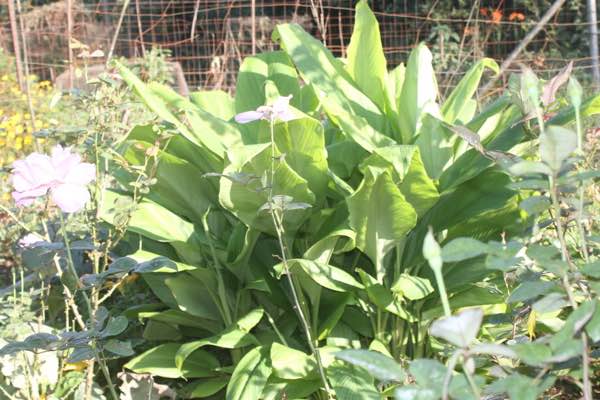 A forest of turmeric plants; a spice for every garden.
A forest of turmeric plants; a spice for every garden.The material expressed on this page is gleaned from the nutritional and environmental literature; it is clearly referenced. A plain distinction is made between the author's opinion and that which is scientifically proven. When in doubt consult your health professional.
To suggest a correction or clarification, write to Dr Bernard Preston here. Contact.
Red foods for better health
Red foods for better health; it's about the lycopenes in tomatoes and capsaicin in peppers. We should be enjoying them several times a week, even daily.
May God bless you today as you ponder these weighty matters. Tomorrow we will consider the orange and yellow foods.
When browsing use right click and "Open Link in New Tab" or you may get a bad gateway signal.
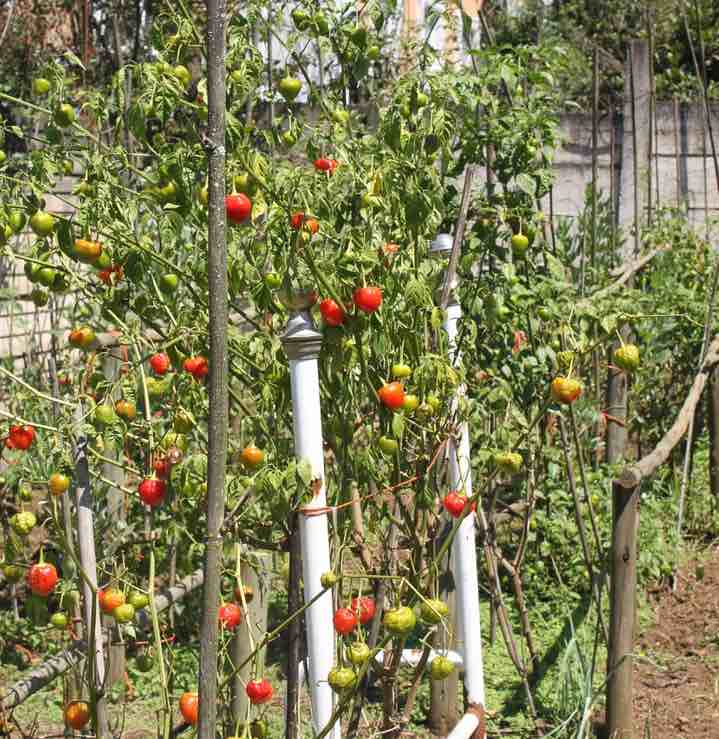
Growing peppadews is not difficult but the plants do need to be supported.
Coloured foods for better health
From the horse's mouth
Newsletter
Our newsletter is entitled "create a cyan zone" at your home, preserving both yourself and Mother Earth for future generations; and the family too, of course. We promise not to spam you with daily emails promoting various products. You may get an occasional nudge to buy one of my books.
Here are the back issues.
- Lifestyle and ideal body weight
- What are ultra-processed foods?
- Investing in long-term health
- Diseases from plastic exposure
- Intensive lifestyle management for obesity has limited value
- A world largely devoid of Parkinson's Disease
- The impact of friendly bacteria in the tum on the prevention of cancer
- There's a hole in the bucket
- Everyone is talking about weight loss drugs
- Pull the sweet tooth
- If you suffer from heartburn plant a susu
- Refined maize meal and stunting
- Should agriculture and industry get priority for water and electricity?
- Nature is calling
- Mill your own flour
- Bake your own sourdough bread
- Microplastics from our water
- Alternative types of water storage
- Wear your clothes out
- Comfort foods
- Create a bee-friendly environment
- Go to bed slightly hungry
- Keep bees
- Blue zone folk are religious
- Reduce plastic waste
- Family is important
- What can go in compost?
- Grow broad beans for longevity
- Harvest and store sunshine
- Blue zone exercise
- Harvest and store your rainwater
- Create a cyan zone at your home
Did you find this page interesting? How about forwarding it to a friendly book or food junkie? Better still, a social media tick would help.
- Homepage
- Coloured foods
- Red Foods for Better Health
Address:
56 Groenekloof Rd,
Hilton, KZN
South Africa
Website:
https://www.bernard-preston.com